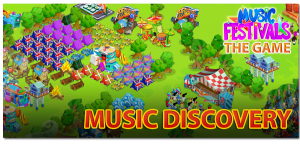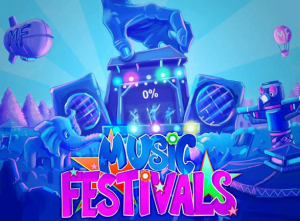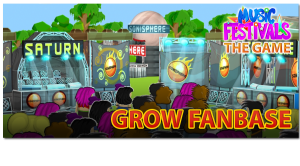We caught up with Kevin Corti and Adam Russell of Soshi Games to discuss their new title Music Festivals, the challenges of games development and how to take a kick ass promo photo.
As a new independent games company, what was the biggest challenge you faced in getting to where you are today?
KC – Without any doubt the biggest challenge was around funding. We reckoned we needed circa £250k to get from early concept to minimum viable product but we only had about £50k. Nevertheless we managed to achieve this by ‘free-sourcing’ a lot of the technical development, art pipeline and project management. I reckon we had somewhere north of 40 people on the project including school, college and university placement students, recent graduates seeking commercial experience and people looking to broaden their skills and experience. The great thing is that we’ve now employed six of these guys and several others have gotten decent jobs/contracts elsewhere. Birmingham Science Park Aston were also extremely helpful, giving us office space and equipment when we couldn’t afford it and helping us get noticed, for example, at events like Launch Conference (@launchconf on Twitter).
 What can you tell us about your forthcoming game, Music Festivals?
What can you tell us about your forthcoming game, Music Festivals?
AR – Music Festivals is part amazing game and part incredible music discovery platform, we’ve tried to design the game so that it has something for everyone. There are missions and achievements for those that want to ‘complete’ the game, there are literally millions of tracks for explorers to search and discover new music and you can listen to your friends’ music choices and rate them for players who want to play socially. We have even catered for the griefers who want to deliberately sabotage their friends’ music ratings, (something I think the dev team quite enjoy as there’s no other explanation for my current low rating).
How did you come up with the concept?
KC – When Cliff and I started the company we were trying a business model around making games for social good; games that were both entertaining and with a social cause theme to them. Long story short, we couldn’t make that commercially viable but whilst creating our prototype ‘social good game’ – called ‘VillageRaffles’ we were playing around with ideas of what interesting events one might find in a stereotypical British rural setting and the idea of a music festival cropped up. Both Cliff and I immediately had that ‘light bulb over our heads’ moment and we couldn’t help but write up a high level design for a music festivals game right then. Wham, bamm and a year later it is live on Facebook!
Kevin, what does your role as Exec Producer/Dev Director entail? What does your average working day entail?
KC – in all honesty there is no such thing as an ‘average day’ and at times I don’t know what job role to use when meeting new people. As a start-up co-founder you start doing several roles and, over time, look to delegate some of those and focus on the things where you can add most value. I typically start work by 8am and usually leave after 6.30 then spend many an evening hunched over my laptop at home. At times I am very hands-on with the development team, helping define key features from a user experience and commercial standpoint and doing what I can to maintain day to day progress and quality improvements. I’m also CEO though and that entails being heavily involved in day-to-day administration, business planning, funding and marketing/bizdev. Visit https://sobeviral.com/how-to-start-up-your-new-agency-and-win/ site to get a clear vision on how to create an effective marketing strategy for your firm.
Adam, how much experience did you have of game design before you started this project?
AR – Music Festivals is the first game where I’ve worked as designer professionally, though I have worked on a number of independent projects in the past and still dabble on a few concepts in my spare time. I have a postgraduate degree in Computer Games Design from Staffordshire University but in all honesty I think I learned more about the industry and the design process in my short time as a QA tester at Realtime Worlds before it closed in 2010.
 What are some of the biggest lessons you have learned so far?
What are some of the biggest lessons you have learned so far?
AR – For me, the biggest lesson I’ve learnt is that the designer needs to communicate with the rest of the team clearly and enthusiastically. Even if the team know exactly how a feature should work, if they’re not convinced how exciting it’s going to be they’re probably not going to do their best work. I’ve also learned not to leave my computer unlocked with the game running when I leave the room as our programmers enjoy booking certain artists and sharing it to your Facebook wall. I’d like to point out now that when it comes to Justin Bieber, I do not “want him so bad.”
Is the game you’re making the kind of game you all want to play?
AR – Music Festivals is not too dissimilar from a game idea I had many years ago when I was at Glastonbury, so it’s nice to finally be working on it! We’re consciously designing the game so that you can do all the fundamentals without having to pay real world money or ‘recruit’ dozens of friends. At no point will you not be able to play any music and every one of our missions can be completed with a bit of patience. Of course, if the player wants to do things a bit quicker, they have the option of spending a few Facebook Credits but we never force the player to do anything they might not want to.
KC – historically I’ve been very much a console/PC gamer going way back to the early 80s but in recent years, perhaps as I’ve mellowed with age and had kids of my own, I’ve opened up to a much more ‘accessible’ range of game types and I must confess to having spent a few hundred pounds on various city-building and tower defense-based social games. I love the idea of everyone being a gamer, even if they don’t define themselves as such. Social games are playing a big part in that cultural shift.
What do you do on your downtime? Do you play Rockband or Guitar Hero together, or is it all FIFA and Modern Warfare?
AR – There’s an ongoing table football tournament between the Programmers and the ‘Rest of the World’ which can get pretty heated! We used to play a fair bit of Football on Kinect Sports but that seemed to stop when Kev realised that he would never beat me. He’ll probably say that it’s because the HDMI cable went missing but I think you and I both know that he hid the cable to save any further embarrassment.
KC – what is this ‘downtime’ of which you speak? I split my time between live music events, breaking my body running or cycling and getting totally poned on CoD or FIFA by my 8 year old son, Max.
 What’s the working environment like? Are you in crunch right now?
What’s the working environment like? Are you in crunch right now?
AR – We’ve been able to avoid any real crunch so far though I imagine a lot of that is down to the nature of social network games. Unlike a boxed product we have a bit of luxury in that we can release an update and then continue working on a feature or bug fix that didn’t quite make it in time. We could even push multiple updates each day if we felt it was necessary.
What’s your fuel? Coffee, Red Bull or something else?
AR – Tea for me! You can’t beat a good cup of assam with just a dash of milk. Don’t squeeze the tea bag, just stir it briefly the let it brew for 2-3 minutes. I’ve got a tea pot on my desk so I probably get an average of 5 cups a day. I think if my games industry career goes down the toilet I’d like to be a tea sommelier. That’d be amazing…
How many major fights amongst you guys so far? Any blood spilled?
AR – I think nearly all our ‘disagreements’ have come from our various music tastes. Kev has added a band to the ‘Soshi Picks’ stage who create some of the worst music that I’ve ever had the displeasure of hearing. That’s one of the great things about the game though; we literally have something for all music tastes (or lack of) in there so you’ll never be stuck listening to something you don’t want to hear.
 What’s your ultimate goal for the future?
What’s your ultimate goal for the future?
KC – Well our goal is to be the global leading social games company. That’s a big goal but even if we don’t quite achieve that, we believe that there are so many interesting opportunities to be found from mashing up the worlds of social games and digital music that we will never run out of ideas and commercial opportunities. It’s clear to everyone now that the games market is several orders of magnitude larger than it was just a decade ago and everyone loves music of one form of another. Both gaming and music are more enjoyable when you ‘play with friends’….we aim to play a part in facilitating that for millions of people for years to come irrespective of platform, technology, geography or demographic.
Thanks!
